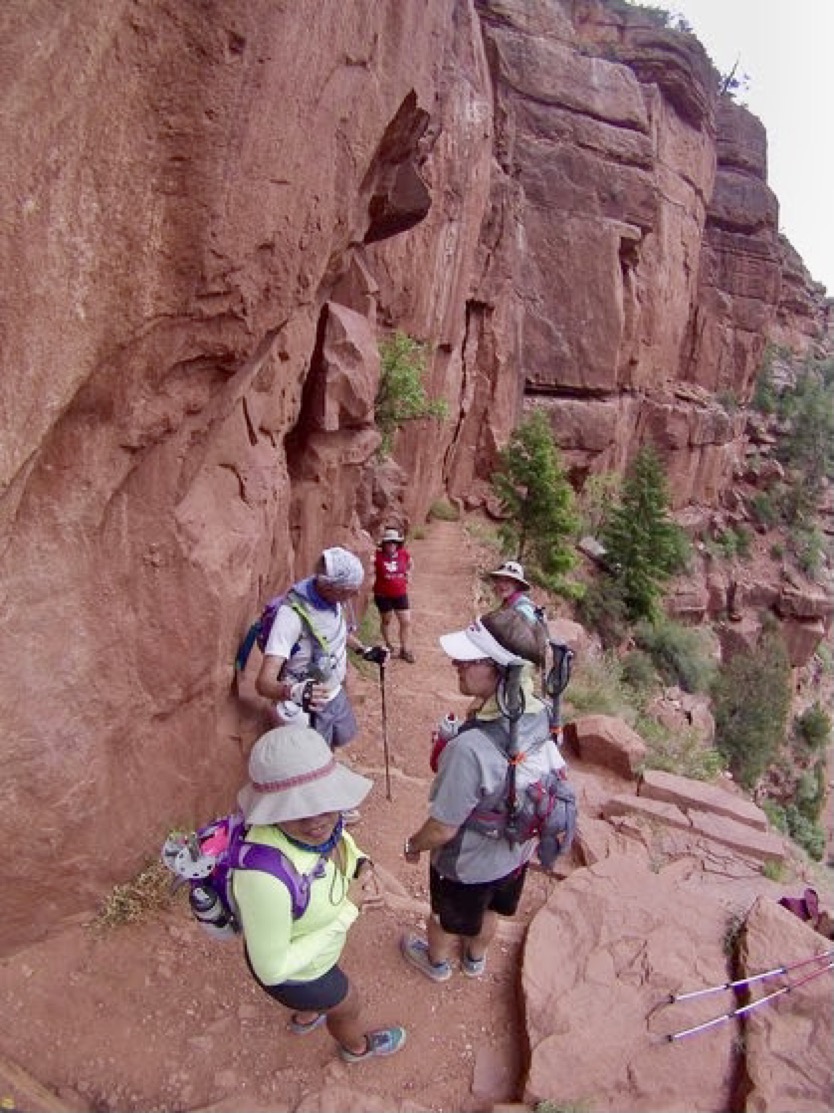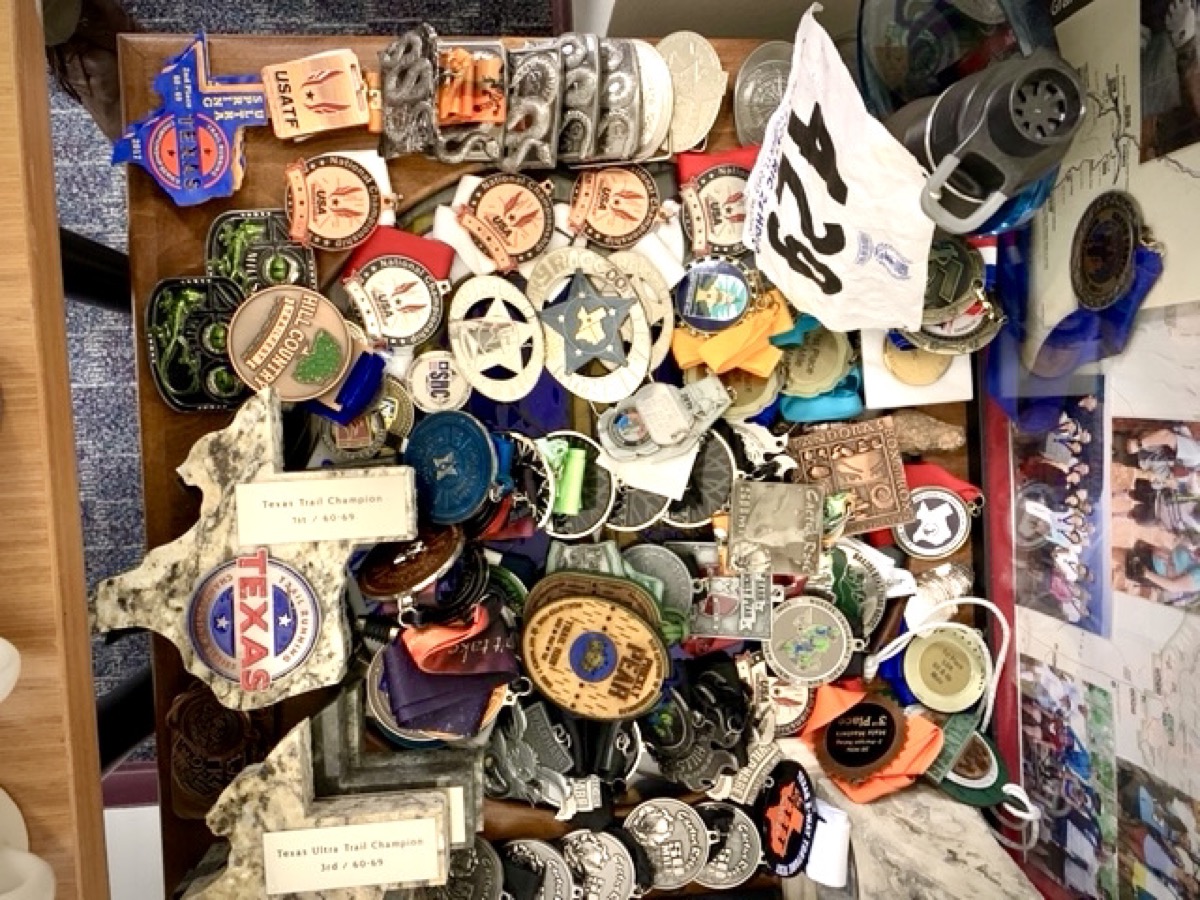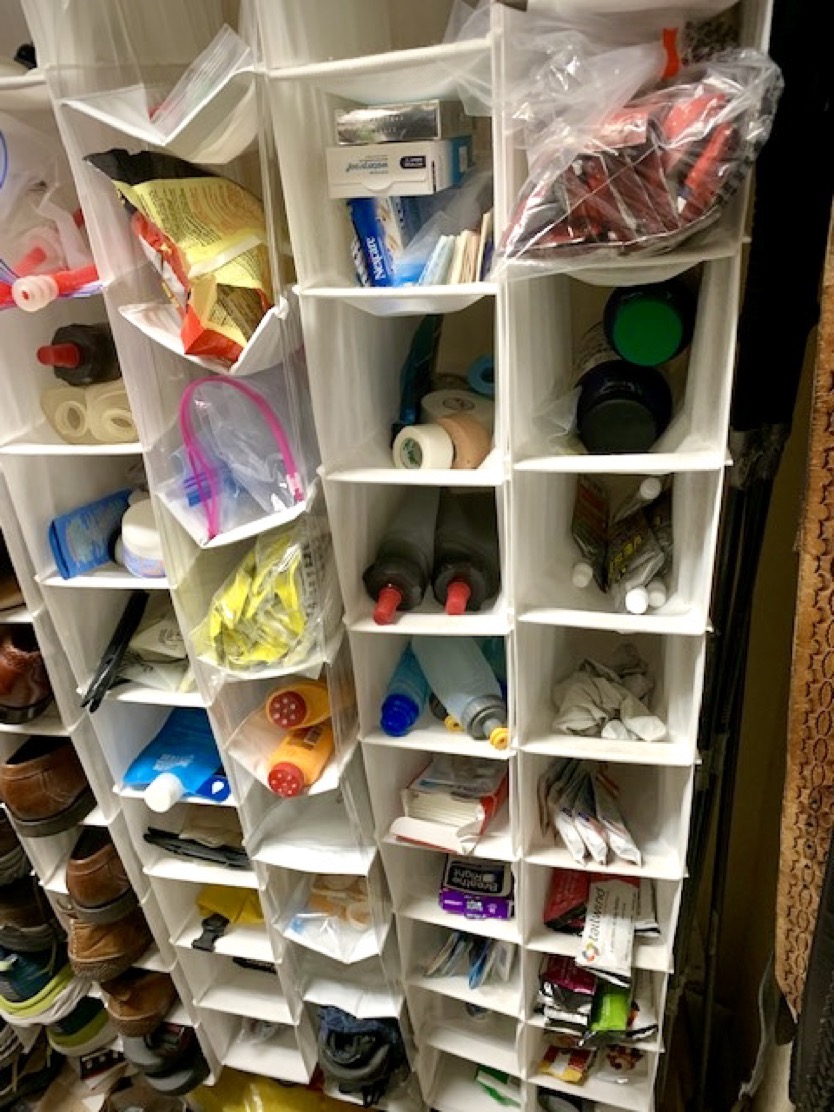‘Age-Old Runners’ is an article series where we explore runners’ performance potential after the age of 45 by interviewing excellent middle-aged runners. Is there still potential to improve? What roles do motivation, mindset, and specific training and recovery techniques play in allowing runners in their mid-forties to mid-sixties to continue to excel? To learn more about this series’ goals, check out its introductory article.
Richard is one of the pillars of the San Antonio, Texas trail running community. Most San Antonio Rockhoppers have at least a few stories about his generosity, kindness, and care. Richard started running trail ultramarathons around 2008 when he was 54, and now, at age 67, he’s run more than 54 of them. [Editor’s Note: Richard requests anonymity, so we’re using his first name.]
Initially, running was simply a means to get to his girlfriend’s house in high school (three miles each way), but Richard kept running recreationally and completed his first marathon in 1978. He’s been racing ever since. In 2014, at ages 59 and 60, he ran 13 trail races, of which 10 were ultras. In 2019, he ran the Cactus Rose 50 Mile and the Destin Beach 50 Mile. He plans to run a 50k in March.
The following is a transcript of a phone interview with Richard. It has been edited for brevity and clarity.
What is your potential to improve as a 67-year-old runner?
My best years were when I was between 50 and 59. But at about age 52, I knew 9:00-minute-mile pace was going to be a thing of the past. I could sense I was working as hard as before, but now [I was] just going 9:30. And then when I turned 60, my slowing down has been exponential. It’s not linear. Boy, to do a 10-minute mile now is really tough. A 13-minute mile is my norm. Call it a shuffle, call it running, call it whatever you want. So the reason you go out becomes [paramount.] You do it for yourself, not for other people. I have all the t-shirts, all the swag that you would ever want. I run because it’s a way to think and relax. I had a trainer a decade ago, and he was all about lifting weights, and I came to the conclusion that every minute, every hour that you would spend at the gym is an hour that you’re not going to run. And as you get older, as I was going to see the end of my life, then every minute was: Why are you doing this? Are you doing it to be fast? Or are you doing it because you enjoy doing it?
Having said that, everybody is different…. There are different reasons why [older runners keep training and racing.] And all their reasons are good. If you want to be fast, then be fast. For me… it’s a way to solve the world’s problems when I run, and the speed does not make a difference to me. It’s just a matter of getting out.
So at age 67, you feel you have no potential to run faster. Do you think you can improve in other aspects of your running?
I’m not going to improve in speed. I want to improve in distance. I want a 30 miler to be easy. I want 50 milers to be hard. And I want 100 milers to be the hardest of the hard. I want to be able to run 100 miles in about 30 to 36 hours.
Why is distance important to you? Why those time goals?
Just because I can. I can’t go as fast, but I can go long or longer than most. Last night, I received an email, and I need to think about how exactly to answer it. So I’ll wait until I run, and it’ll take about an hour to sort out all the pluses and minuses. I run an hour during the day and then three or four hours during the weekend. I’d like to get to where I could do four hours without thinking. Four hours is still sort of hard.
Has getting older as a runner distressed you?
For only a couple of weeks… but focusing on effort has always been the satisfaction achieved. Knowing what to expect next became important…. It is what you want that is important. You can want recognition on many different levels.
How long have you been a runner?
I met [my wife] Jeannie in 1968. We were in high school together, and I would run almost 3.5 miles to her house, and then we’d make out, and then I’d run home. The running part of it was just because I didn’t own a car…. When I was in college at the University of Texas at Austin, I would run 10 to 12 miles at lunch. It was about a 7:30 minute-mile pace. It was just easy. My first marathon was in 1978 in Galveston, Texas. I hurt myself at about the 16-mile point, and I finished in 4:03. I lost track [of all the marathons I’ve done] after a while. I don’t think I’ve done all 50 states.
When did you move from the roads to the trails?
My first trail run was probably in Wichita[, Kansas.] Then, I went after the 100k there in [Washington,] DC. That was down on the National Mall. We just did a two-mile loop there. You did it over and over again. But I became a true ultra-type person in the 2007 to 2008 timeframe. I was doing an ultra almost every month then.
What do you enjoy about racing?
At first, it was just not being last. Then, it became okay to be last, and it was finishing within the timeframe allotted. That became a goal.
And the community. There was a guy at the Rocky Raccoon 100 Mile, and he was hypothermic. It was 23 degrees Fahrenheit, and a gal gave up her race and jumped on top of him to warm him up…. It was more important to keep this guy alive. I remember [at one of my triathlons], a gal was going down a hill and crashed, and people stopped to get around her, but they were cannibalizing her gear. “Oh, you won’t need this now.” So the trail community is a lot different.
Do you race for the same reasons now as when you started?
Yes. I still solve a lot of the world’s problems when I run. You do a lot of thinking along the way. I remember when [my friend Jessica and I] did Rocky Raccoon one year, and she quit at 80 miles. And I said, “Hey it’s only 20 more miles!” And she said, “I wasn’t having fun.” I said, “This isn’t about having fun. This is about finishing.” But she helped open my eyes. It is about having fun.
Jessica and [another friend] Jean were pacing me during one of these ultras, and they told me I couldn’t feel sorry for myself. They told me I needed to greet everybody [who ran by.] Not just say hi, but genuinely greet them, to care about the people as they passed. Those types of things have made all the difference over time.
Do you look forward to races as much as when you first started?
Yes. Mainly because it’s an organized milestone.
Why do you think older runners stop racing?
I think some [older runners] race because of the swag. The t-shirt, the medal, that type of stuff. [I know older runners who] didn’t start in the 1960s, so they don’t have 30 or 40 years of swag in a closet. It’s still cool for them. But not me. I expect after 10 or 12 years, they’ll also think, Oh I don’t need another medal. All that becomes irrelevant.
So they stop because the prizes become less meaningful? If race directors prioritized publicizing age-group records, do you think that would keep more older runners racing?
If you’d asked me that question 10 years ago, I would have said yes. I participated in the Texas Trail Championship Series and that was good. But it was only good for the half hour when you went out and picked up the medal. I’ve got a whole bunch of them on the table here. And now, [they don’t matter to me.] But I needed to go through that to get to the, “Why are you really doing this?” That doesn’t mean it wouldn’t [entice] other people.
How has your training changed since you started running?
I don’t think my training has changed much. I still run four to eight miles a day. Now, four miles is going to take 50 minutes or an hour as opposed to 35 minutes. So the volume has not changed, just the time it takes me to do it.
Did you incorporate much speedwork into your training when you started?
I did 220s and 440s and lifted weights all that. I went to the Boston Marathon, so I did all that stuff to be fast to make those types of cutoffs. I could run from the Pentagon to the National Mall and back in less than an hour–that’s eight miles. I also had a trainer there at the Pentagon, and three days a week, I would lift weights for an hour to an hour and a half.
And now?
I don’t do any speedwork now. That is a thing of the past. It’s not about speed anymore. It’s just about the distance.
Do you stretch regularly?
No, I like to say that is what the first couple of miles are for. At the most, I will stretch for about three minutes. But we are all different and need different things. I think stretching is wonderful for the right reasons. I just haven’t needed those yet.
Do you think you’ll do more timed events, so you don’t have to worry about cutoffs?
For me, 30 hours for a 100 miler is the new goal. I’m signed up for the Snowdrop Ultra 55 Hour. You have 55 hours to see how far you can go. I learned you want the time to be generous, so that you don’t worry about making the cutoff.
On being a runner and not a hiker.
One of the times I was out with Joe Prusaitis, he said: “You know, you could go faster if you hiked fast.” And about four years ago, maybe it was longer, I came to the realization that even if I was moving at an 18-minute pace at the end of a 100 miler, I wanted both feet off the ground. I wanted to at least think I was running as opposed to hiking fast—even if the fast hikers passed me. I did the Leadville Trail 100 Mile one year, and this guy who was hiking fast, hiked past me. And I said to myself: That’s okay. He’s out for his reasons and I’m out for my reasons. And as long as I think I’m running, as long as I’m putting forth the effort to run, that’s what’s important. I’m not a hiker. I’m a runner.
Do you limit your diet in any way?
My two cents is that it doesn’t matter whether you go for the South Beach Diet or all protein or low fat. All of them start out with, you can’t take in processed foods. As long as you’re loyal to that, it doesn’t matter.
Training specifics:
- Weekly running volume: Forty to 50 miles
- Strength training: No
- Off-season: No
- Sleep: About eight hours, but fitful
- Race nutrition: Gels, The Right Stuff sports drink, electrolyte capsules
- Recovery: Varies, takes a recovery day when fatigued
Three factors Rich attributes his running performance to:
- Genetics
- Understanding running’s value to his life
- The trail running community’s support
Call for Comments
- Age-group runners, what motivates you to get out on a daily basis?
- And, what if anything encourages you to run races?



